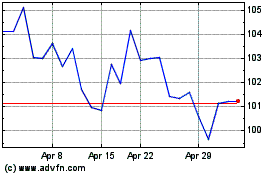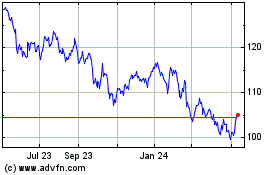Big Food Looks to Startups for Ideas, Innovation
February 17 2017 - 5:59AM
Dow Jones News
By Annie Gasparro
When General Mills Inc. and Kellogg Co. couldn't beat the
startups appearing on store shelves next to their Yoplait yogurt
and Froot Loops cereal, they decided to invest in them.
Food giants are starting venture-capital funds to invest in
startups focused on healthier and less-processed foods, betting the
younger companies can teach them to be more entrepreneurial and
innovative. Slow to recognize consumers' shift toward those
products, global titans have found themselves stuck in a rut. This
week, Nestlé SA, the world's largest packaged-food company, dropped
its long-running sales-growth target for the next three years,
saying it needs time to adapt to these fundamental changes in the
industry.
"It's hard for consumer companies to step out of what they've
been locked into for 60 or 80 years," said Ryan Caldbeck, founder
and chief executive of CircleUp, a business that connects
private-equity firms with food startups. CircleUp says large
consumer-goods companies lost $18 billion in market share to
smaller competitors between 2011 and 2015.
In January Kellogg's fund, Eighteen94 Capital led a $4.2 million
investment in Kuli Kuli, which makes snacks with moringa, a leafy
green tree common in Asia, Latin America and Africa. A week later,
General Mills' venture-capital fund, 301 Inc., made a second
investment of $6 million in Rhythm Superfoods, maker of "zesty
nacho"-flavored kale chips.
Campbell Soup Co. and Tyson Foods Inc. dedicated $125 million
and $150 million, respectively, toward their in-house venture funds
last year.
In total, venture capital funds made 66
food-and-beverage-related deals last year, up 20% from 2015. About
a fifth were backed by big food companies, according to Dow Jones
Venturesource.
Because food giants and emerging brands are also competitors,
some entrepreneurs have been wary of entreaties from these
investors.
"If I tell you all our trade secrets, what's going to stop
Kellogg from making their own moringa bar?" Kuli Kuli founder Lisa
Curtis recalls asking Simon Burton, the head of Kellogg's venture
capital fund.
Mr. Burton acknowledges that Kellogg is looking for marketing
and recipe ideas that can help improve the performance of its older
brands like Nutri-Grain bars and Chex Mix. "We're looking for a
mutual benefit on top of the return on investment," he said.
Ms. Curtis said access to Kellogg's resources and reach in the
industry made that partnership worth it. "The deal gave us
validation," said the 29-year-old former Peace Corps volunteer.
Rhythm Superfoods Chief Executive Scott Jensen said many of his
peers are more open to a minority investment than a full
acquisition. Some have heard cautionary tales of startups that
slipped after teaming with big food makers, like Kellogg's rocky
pairing with cereal-maker Kashi. A few years into its ownership,
Kellogg merged Kashi with its broader operations, and the once
ahead-of-the-curve brand began falling behind on innovation.
Mr. Jensen first met General Mills executives at a Fancy Food
Show in San Francisco in January 2015. A year later, General Mills
led a $3 million investment in his kale chip company. He said he
has benefitted from resources such as General Mills' array of
specialists, like an engineer who works only on bagging
machines.
Rhythm's sales rose 30% in 2016. Mr. Jensen expects sales to
rise another 40% this year to more than $20 million. But General
Mills isn't "telling us how to run our business. And now that other
people can see that, I have a lot of people who come to me and say,
'Can you introduce me to them?'"
Write to Annie Gasparro at annie.gasparro@wsj.com
(END) Dow Jones Newswires
February 17, 2017 05:44 ET (10:44 GMT)
Copyright (c) 2017 Dow Jones & Company, Inc.
Nestle (PK) (USOTC:NSRGY)
Historical Stock Chart
From Mar 2024 to Apr 2024

Nestle (PK) (USOTC:NSRGY)
Historical Stock Chart
From Apr 2023 to Apr 2024
